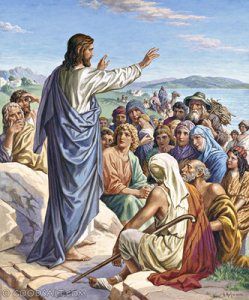Understanding Nuance
The Bible is a large book and for us, people centuries separated from the events that transpired in it, the book can sometimes seem complicated and difficult to understand. For believers, that fact can sometimes be a roadblock to our progression in the faith. Thankfully for us, God has provided help for us in the form of the Holy Spirit. Paul mentions this:
Now we have received, not the spirit of the world, but the Spirit who is from God, so that we may know the things freely given to us by God, which things we also speak, not in words taught by human wisdom, but in those taught by the Spirit, combining spiritual thoughts with spiritual words. - 1 Corinthians 2:12-13God also provided us with people who are blessed with the gifts of knowledge, wisdom, and understanding, which are needed to make sense of the Bible and lead God’s people according to what it says.
So Christ himself gave the apostles, the prophets, the evangelists, the pastors and teachers, to equip his people for works of service, so that the body of Christ may be built up - Ephesians:11-12Unfortunately, nonbelievers either do not have access to or choose not to use these resources from God. Even worse, many of them, out of lack of understanding of what the Bible is telling us, will try to poke holes in what the Bible says in an effort to disprove the legitimacy of the Faith. Sometimes the arguments made can even sound convincing, particularly to those that are still new or weak in their faith. One of the most common claims is that the Bible contradicts itself. Opponents of Christianity will say that the Bible instructs us to do things that aren’t logically consistent or that in one area we’ll be instructed to not do something and later in another passage we will be instructed to do that same thing.
Of course, most examples of these supposed contradictions can be easily explained. In most cases, the people pointing out the contradictions are simply missing the nuance expressed in the verses. They tend to ignore the small but important differences. For example, Mathew 5:13-16 says:
You are the salt of the earth. But if the salt loses its saltiness, how can it be made salty again? It is no longer good for anything, except to be thrown out and trampled underfoot.“You are the light of the world. A town built on a hill cannot be hidden. Neither do people light a lamp and put it under a bowl. Instead they put it on its stand, and it gives light to everyone in the house. In the same way, let your light shine before others, that they may see your good deeds and glorify your Father in heaven.Here Jesus appears to be teaching that followers of God should make it known that they serve Him and perform their good acts in a way that those acts will be seen. However, in the very next chapter, Matthew 6:1-4, Jesus says:
“Be careful not to practice your righteousness in front of others to be seen by them. If you do, you will have no reward from your Father in heaven.At first glance this may seem like a contradiction. In the first set of verses, Jesus tells us to perform our good deeds in a way that will be seen. In the second set of verses, Jesus tells us to give to the needy, which would certainly be considered a good deed, in secret. He even goes on in the following verses to say that we should also pray and fast in an inconspicuous manner. Is Jesus really giving two sets of contradictory instructions? No, this is where understanding the nuance comes into play.
“So when you give to the needy, do not announce it with trumpets, as the hypocrites do in the synagogues and on the streets, to be honored by others. Truly I tell you, they have received their reward in full. But when you give to the needy, do not let your left hand know what your right hand is doing, so that your giving may be in secret. Then your Father, who sees what is done in secret, will reward you.
In the first verses, Jesus is making it clear that our faith should be active. We are not meant to be followers of God in secret. If we truly follow God, we should do it in a way that makes it clear to everyone that whatever righteousness we have or practice is a result of our faith. In the second set of verses, Jesus is in fact telling his followers to do some things associated with God in private. However, there is a very big distinction. In the first set of verses, our reason for wanting to be seen is for our actions to glorify God. In the second set of verses, Jesus is warning against actions taken to glorify ourselves. It’s not a contradiction at all. In fact, they both lead to the same goal, which is God receiving all the glory. Whether it is doing things in a way that results in God geting the credit or hiding things that might result in us getting credit instead, either way, our purpose is to glorify God.
It is important that we do our best to understand exactly what God’s Word is saying not just so we can respond to people who have questions about or seek to question it. We also need understanding to ensure that our own walks are correct. Sometimes the nuance might be hard to see. That’s when we need to fellowship with others that are blessed with understanding and lean more on the Holy Spirit. In the end, whatever we do, we want to make sure that our actions and beliefs are actually in line with what God has commanded.
Chris Lawyer
Image Courtesy of Pinterest


Comments
Post a Comment